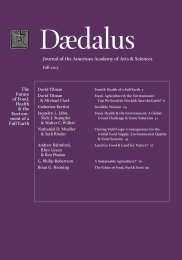The Ethics of Food, Fuel & Feed
As the collective impact of human activity approaches Earth's biophysical limits, the ethics of food become increasingly important. Hundreds of millions of people remain undernourished, yet only 60 percent of the global harvest is consumed by humans, while 35 percent is fed to livestock and 5 percent is used for biofuels and other industrial products. This essay considers the ethics of such use of edible nutrition for feedstock and biofuel. How humanity uses Earth's land is a reflection of its values. The current land-use arrangements, which divert 40 percent of all food to feed animals or create fuels, suggest that dietary and transportation preferences of wealthier individuals are considered more important than feeding undernourished people, or the stability of the wider biotic community.
As the collective impact of human activity approaches Earth’s biophysical limits, the ethics of food become increasingly important. Human agriculture has a tremendous impact on global ecosystems. Worldwide agriculture has already “cleared or covered 70 percent of the grassland, 50 percent of the savanna, 45 percent of the temperate deciduous forest, and 27 percent of the tropical forest biome.”1 Despite the scale of global agricultural production, more than eight hundred and seventy million people remain undernourished.2 It is striking, then, that only 60 percent of the global harvest is consumed by humans, while another 35 percent is fed to livestock and the remaining 5 percent is used for biofuels and other industrial products.3
This essay considers whether such use of edible nutrition for feedstock and biofuel production is ethically justified. The analysis will proceed in two parts: the first part builds on earlier work that examines the impact of using feedstock to create meat and other animal-based food products; the second part considers the ethics of biofuel production, which has been left out of earlier analysis.4 I conclude that although there are important and morally relevant differences between various modes of agricultural production, given the present and projected size of the . . .
Endnotes
- 1Jonathan A. Foley, Navin Ramankutty, Kate A. Brauman, et al., “Solutions for a Cultivated Planet,” Nature 478 (7369) (2011): 338.
- 2Food and Agriculture Organization of the United Nations, The State of Food Insecurity in the World 2012: Economic Growth is Necessary but Not Sufficient to Accelerate Reduction of Hunger and Malnutrition (Rome: Food and Agriculture Organization of the United Nations, 2012), http:// www.fao.org/docrep/016/i3027e/i3027e00.htm.
- 3Jonathan A. Foley, “Can We Feed the World and Sustain the Planet?” Scientific American 305 (5) (2011): 62.
- 4Brian G. Henning, “Standing in Livestock’s ‘Long Shadow’: The Ethics of Eating Meat on a Small Planet,” Ethics & the Environment 16 (2) (2011): 63–93.
